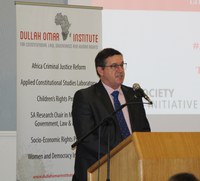South Africa makes great strides towards meeting SDG16
The workshop was organised by the the Dullah Omar Institute at the University of the Western Cape in conjunction with African Centre of Excellence for Access to Justice (ACE-AJ) as a contribution to the policy debates aimed at access to justice in Africa and Asia in view of the SDG 16.
The Deputy Minister commenced his opening speech by noting that the 2030 agenda is a roadmap to goals which we aim to achieve in the SDGs. He pointed out that some of the key benchmarks that South Africa has achieved in furtherance of SDG 16 includes; strengthening the Police, having a single prosecuting authority, establishment of a working, vibrant judiciary and the creation of oversight bodies such as the Independent Police Investigative Directorate (IPID), to support constitutional democracy. The deputy minister however noted that South Africa still needs to do more with regard to gender representation in the judiciary, specifically at the higher courts.
He noted that SDG 16 aims to promote the rule of law and ensure access to justice for all. It urges countries to develop accountability mechanisms and promote and enforce non-discriminatory policies and laws for sustainable development. Goal 16 and target 3 highlights the importance of access to justice in achieving sustainable development. He noted that the implementation of SDG 16 will ensure rule of law, combat organised crime and ensure responsive, inclusive and participatory decision making in society.
The Deputy Minister noted that some foundational pillars have been aligned to the justice structures with the Constitution, in a bid to enhance access to justice through the creation of specialised courts. Some of these specialised courts directly deal with designated matters related to elections, constitutional matters, competition issues, small claims, equality issues and sexual offences, among others.
Other focus areas of the justice system since 1994 has been on the protection of vulnerable groups in the country including women, children, persons with disabilities and the LGBTI community. He noted that much of what has been done since 1994 is to ensure everyone has the right to access justice. In this regard, he underscored access to legal aid as a key feature in achieving access to justice for the poor and vulnerable in society. Without access to legal aid, millions are at risk. In furtherance of this, Legal Aid had various local and satellite office across South Africa and took on over 420,000 matters in the last financial year.
Hon John Jeffery noted that lessons had been learnt along the way including the need to involve Civil Society Organisations (CSOs), as partnerships with non-government sector and civil society did in fact strengthen the justice system. In this regard, the protection of the rights of LGBTI through the Rapid Response team (made up of the SAPS, NPA, DOJ, and representatives from civil society) was a best practice example of partnerships between government and civil society as cited by the UNHCR.
In closing, he noted that it is important for the government to continue to form partnerships especially with civil society, in the fulfillment of the SDGs. At the heart of SDGs lies human rights, and if we don’t make human rights and access to justice a priority, we make a talk shop of the SDGs. Active citizenry promotes human rights and human rights is the responsibility of all.

